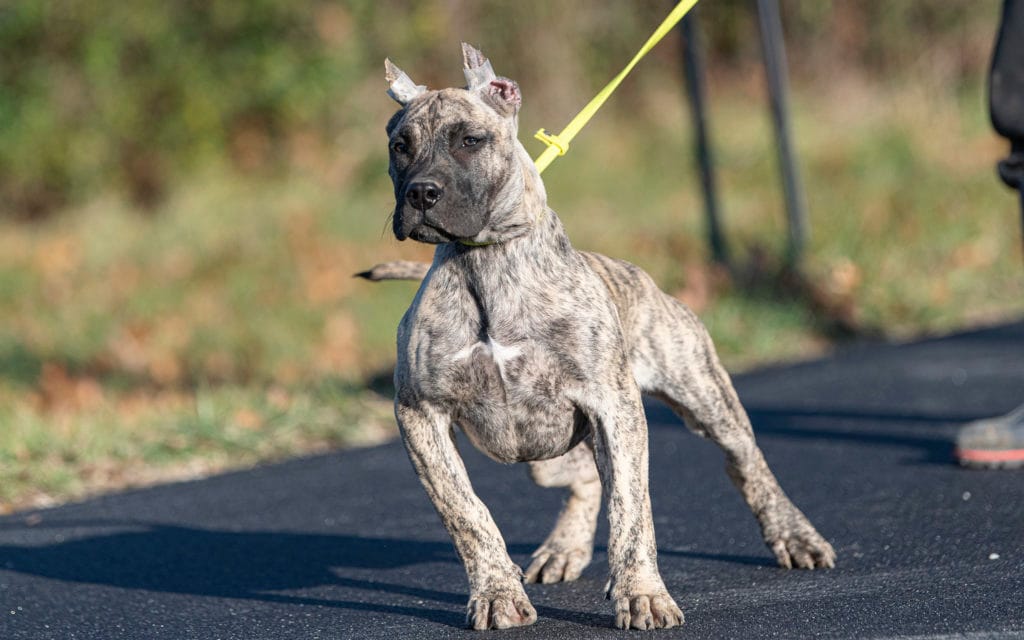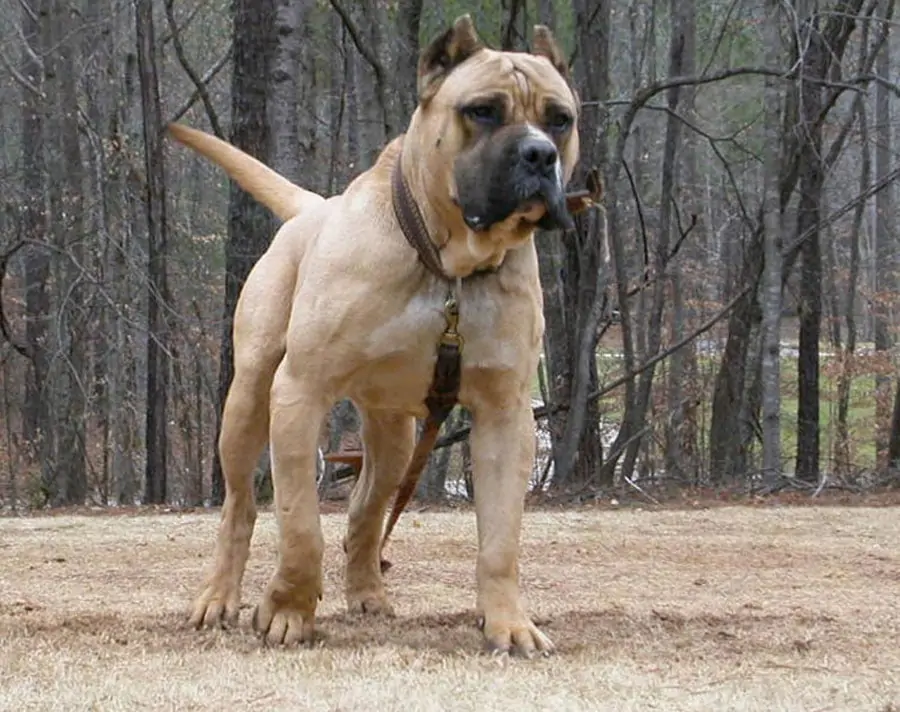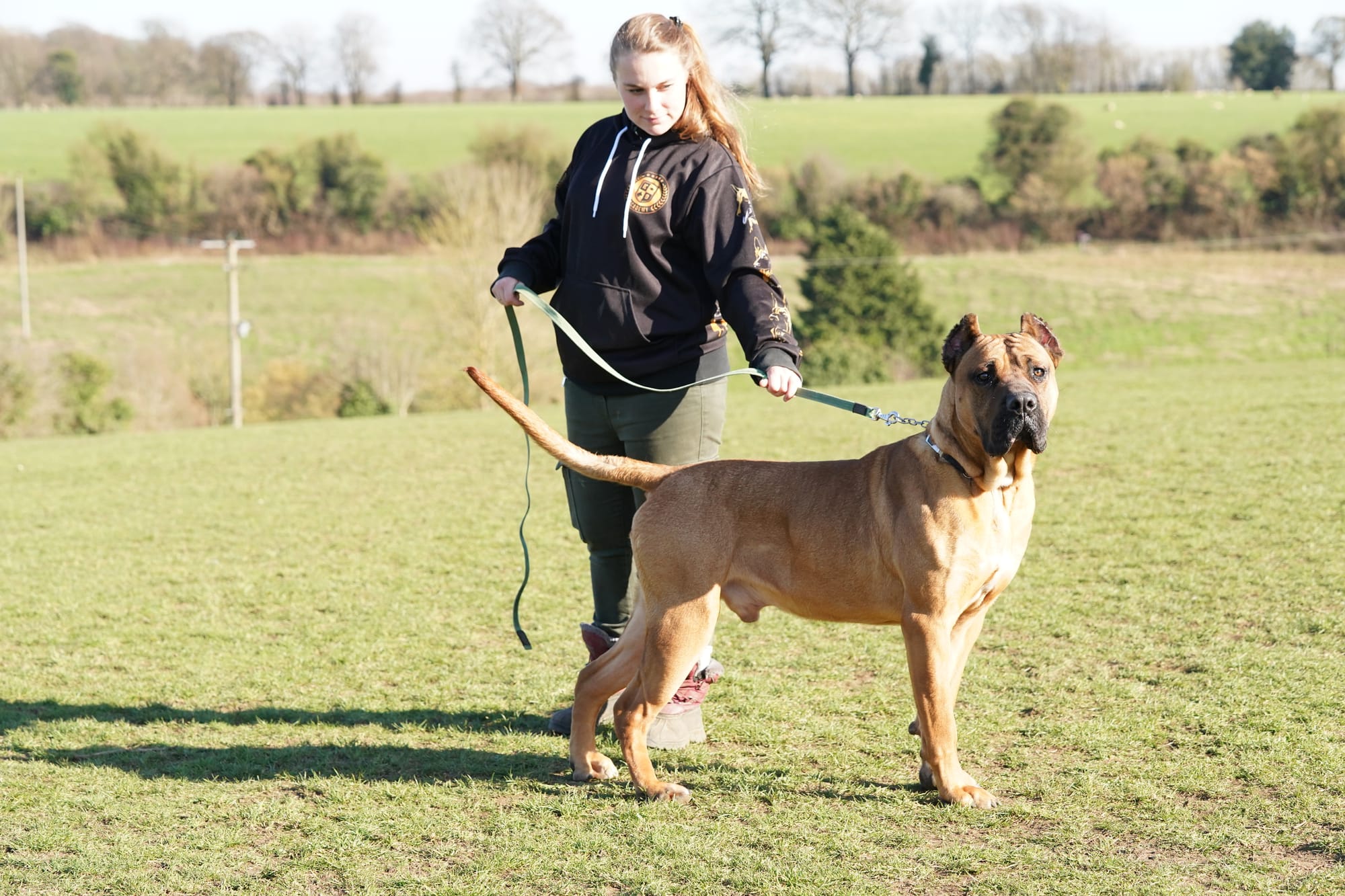In this blog post, we will dive deep into the heart of Presa Canario training, shedding light on whether it's an easy task for novices or a challenging endeavor that demands patience and dedication. Get ready to be captivated by the allure of training these magnificent dogs, as we guide you through the essentials, from assessing your readiness to harnessing modern technology in your training efforts. Join us on this informative journey that promises to empower you with the knowledge and confidence needed to navigate the rewarding path of Presa Canario training.

Introduction to Presa Canario
The Presa Canario, or Perro de Presa Canario, is a breed with a rich and distinct heritage, originating from the Canary Islands of Spain. Known for their imposing size, muscular build, and strong-willed nature, Presa Canarios were historically used for working with livestock and as guard dogs. This breed's origins trace back to the 15th and 16th centuries, evolving through the crossing of local island dogs with mastiffs brought by Spanish conquistadors.
Despite their daunting appearance, Presa Canarios possess a complex temperament that combines loyalty, intelligence, and a protective instinct, making them not just formidable guard dogs but also capable companions.

Recent statistics on dog breed popularity and ownership patterns do not frequently spotlight the Presa Canario, largely due to its specialized nature and the breed's requirements for experienced handling. However, the United Kennel Club (UKC) and the International Canine Federation (FCI) have both recognized the breed, underlining its distinct pedigree and growing appeal among dog enthusiasts globally. Their physical characteristics are notable, with males standing at 23 to 26 inches at the withers and weighing anywhere from 100 to 160 pounds, while females are slightly smaller. The breed's coat is short and coarse, typically found in brindle, fawn, or black. Notably, Presa Canarios require a significant commitment from their owners to meet their exercise, training, and socialization needs.
Early socialization and training emerge as critical components in the upbringing of a Presa Canario. Given their dominant and protective nature, introducing them to a variety of people, animals, and environments at a young age helps in developing a well-adjusted and sociable dog. Moreover, it's essential to dispel common misconceptions about the breed, particularly regarding their temperament. While it's true that Presa Canarios can exhibit assertiveness and a protective demeanor, with proper guidance, they can also display profound gentleness and loyalty towards their families. Addressing these stereotypes is crucial in fostering a more accurate understanding of the breed's true nature.
For those new to the Presa Canario breed, setting realistic expectations for training and companionship is vital. These dogs are not suited for first-time dog owners or those unfamiliar with large, assertive breeds. Their training requires patience, consistency, and an understanding of canine psychology, particularly in establishing leadership within the household. The journey of training a Presa Canario can be immensely rewarding, provided owners are well-prepared for the commitment it entails. As we transition into assessing readiness for taking on such a breed, potential owners need to evaluate their experience, lifestyle, and ability to meet the needs of a Presa Canario.
Assessing Your Readiness
Before embarking on the journey of training a Presa Canario, it's crucial to assess your readiness to handle such a powerful and strong-willed breed. Owning a Presa Canario is not a decision to be taken lightly. These dogs, known for their impressive size and dominant nature, require an owner who is experienced, patient, and consistent.
According to a study by the University of Pennsylvania, which surveyed dog owners on the effectiveness of different training methods, the Presa Canario, like other large breeds, responds best to positive reinforcement and consistent training practices.
Evaluating your experience with large, strong-willed dog breeds is the first step in this assessment. If you have never owned a dog before, or your experience is limited to more compliant, smaller breeds, you may need to consider whether a Presa Canario is the right fit for you. These dogs are not just physically demanding; they also have a complex temperament that requires a knowledgeable and assertive owner. The significance of patience and consistency in training cannot be overstated. Training a Presa Canario is a long-term commitment that demands a considerable amount of time and effort.
Understanding the dedication needed for training is another critical aspect of your readiness. Presa Canarios require daily exercise, mental stimulation, and ongoing training to ensure they remain well-behaved and sociable. This breed is not suitable for individuals who are away from home for long periods or unable to dedicate several hours each week to training and exercise. The time commitment extends beyond the puppy years, as Presa Canarios benefit from continuous training and socialization throughout their lives.
Fortunately, resources and support systems are available for first-time Presa Canario owners. Various online forums, breed-specific clubs, and professional dog trainers specialize in working with powerful breeds like the Presa Canario. These resources can provide invaluable advice, support, and training tips to help you navigate the challenges of ownership. It's essential to leverage these resources to ensure you and your Presa Canario have a successful and harmonious relationship.
Basic Training Essentials

The foundation of a well-behaved Presa Canario lies in the consistency and structure of its training regimen. Establishing a training routine early on is crucial for this breed, known for its intelligence and strong-willed nature. Consistency in commands, rewards, and disciplinary actions helps the dog understand expectations and boundaries. According to a study on dog training methods, consistency in training has been linked to quicker learning and better obedience in dogs, a principle that holds especially true for breeds like the Presa Canario [source].
Positive reinforcement plays a pivotal role in building a strong, trusting bond between the owner and the Presa Canario. This breed responds well to rewards such as treats, praise, and playtime, which encourage repetition of desired behaviors. The use of positive reinforcement is not only effective but also promotes a harmonious relationship, fostering a sense of security and well-being in the dog. This approach contrasts with aversive training methods, which can lead to fear, anxiety, and even aggression, particularly in powerful breeds.
There are essential commands that every Presa Canario should learn to ensure its safety and the safety of those around it. Commands like "Sit," "Stay," "Come," and "Heel" are fundamental in daily interactions and control. Training a Presa Canario to respond reliably to these commands requires patience, as their independent nature can sometimes make them less inclined to immediate obedience. However, with regular, short training sessions, these commands can be successfully ingrained.
Socialization is another critical aspect of training for a Presa Canario. Introducing the dog to various people, animals, environments, and situations from a young age helps prevent the development of fearful or aggressive behaviors. Proper socialization ensures that the Presa Canario grows into a well-adjusted, confident adult capable of handling new experiences and stimuli without undue stress. This process is an ongoing part of the dog’s training that should continue throughout its life to maintain its adaptability and sociability.
Addressing Behavioral Challenges
The Presa Canario, a breed known for its strength, protective instincts, and commanding presence, can present unique behavioral challenges. Among these, dominance, aggression, and stubbornness are often cited by owners as areas of concern. It is crucial to understand the breed's natural disposition towards being assertive to manage these behaviors effectively.
A study on canine aggression pointed out that while genetics play a role in a dog's behavior, environment, and training significantly influence their temperament.
Managing and correcting unwanted behaviors in Presa Canarios requires a nuanced approach. Traditional dominance-based methods may not be effective and can potentially exacerbate aggressive tendencies. Instead, modern dog training emphasizes positive reinforcement, patience, and consistency. It is about rewarding the behavior we want to see more of, which helps in building a trusting and respectful relationship between the dog and its owner. The efficacy of positive reinforcement in training dogs has been widely supported by research, noting its benefits in promoting behavioral flexibility and reducing instances of aggression.
Being perceived as the pack leader is another aspect often discussed in the context of training Presa Canarios. This concept revolves around the idea of establishing and maintaining a leadership role in the relationship, ensuring the dog sees their owner as someone to respect and follow. However, this doesn’t mean resorting to intimidation; it's about setting boundaries, providing structure, and using consistent, positive training methods. Leadership in this sense is about guidance and setting the rules of the house, not about being a dictator.
For owners facing persistent behavioral challenges, seeking help from a professional dog trainer might be the best course of action. Professional trainers can offer personalized advice and strategies tailored to the individual dog, which can be particularly beneficial for breeds as strong-willed as the Presa Canario. They can also provide support in advanced training methods, including behavior modification techniques that address the root causes of aggression and stubbornness. When selecting a trainer, it's important to choose someone experienced with large and potentially challenging breeds, who uses humane, science-based training methods
The Role of Technology in Training

As we navigate the complexities of training a Presa Canario, integrating technology into our methods can significantly enhance our efforts. One innovative tool that has gained popularity among dog owners is the Fi Smart GPS Tracking Dog Collar. This device not only serves as a traditional collar but also offers advanced features like real-time GPS tracking, activity monitoring, and geofencing capabilities.
According to a survey conducted by the American Pet Products Association, nearly 68% of U.S. households own a pet, which underscores the growing market for pet technologies, including smart collars.
The Fi Smart Tracking Dog Collar's GPS tracking feature is particularly beneficial for Presa Canario owners. Given the breed's strong prey drive and propensity to wander if not properly contained, the ability to monitor a dog's location in real time provides an unprecedented level of security and peace of mind. Furthermore, the device's activity monitoring can help owners keep track of Presa Canario's daily exercise, ensuring they are meeting their physical needs to prevent boredom and destructive behaviors.
Another standout feature of the Fi collar is its geofencing capabilities. Owners can set up virtual boundaries and receive alerts if their dog exits these predefined areas. This function is especially useful for Presa Canarios, as it helps prevent them from wandering off property and potentially getting lost or into dangerous situations. Geofencing not only reinforces training efforts by keeping dogs within safe zones but also complements the training by providing a virtual safety net that further secures these large, powerful dogs.
Monitoring a Presa Canario's activity levels through the Fi Smart GPS Tracking Dog Collar is not just about ensuring they're getting enough physical exercise; it's also about engaging their minds. Stimulation is crucial for this intelligent breed, and by tracking their activity levels, owners can gauge whether their dog might be under-stimulated, which could lead to undesirable behaviors. This insight allows for adjustments in training routines, incorporating more mental and physical challenges to keep the dog engaged and well-behaved.
As we delve deeper into the nuances of training a Presa Canario, it's clear that technology, specifically GPS tracking collars like Fi, plays a pivotal role in modern training strategies. These devices offer a blend of safety, security, and convenience that can significantly aid in managing the unique challenges presented by this breed.
Conclusion

In conclusion, Presa Canario training is a fulfilling journey that enhances the relationship between you and your canine companion. With patience, consistency, and positive reinforcement, you can unlock the full potential of this remarkable breed. Celebrate the successes, learn from challenges, and enjoy the unique bond you share with your Presa Canario.
Frequently Asked Questions
Q1: How often should I train my Presa Canario?
A1: Regular, short training sessions are more effective than sporadic long ones. Aim for 10-15 minutes several times a day.
Q2: What should I do if my Presa Canario shows signs of aggression?
A2: Consult with a professional trainer to assess and address the root cause. Avoid confrontational methods that may escalate aggression.
Q3: Can I train my Presa Canario to get along with other pets?
A3: Yes, early socialization and positive reinforcement can help your Presa Canario coexist peacefully with other pets.
Q4: Is it too late to train my adult Presa Canario?
A4: It's never too late to train a dog. While puppies may learn faster, adult Presa Canarios can still benefit from consistent training.
Q5: What is the most important aspect of Presa Canario training?
A5: Building a strong bond through positive reinforcement is crucial for successful Presa Canario training.




